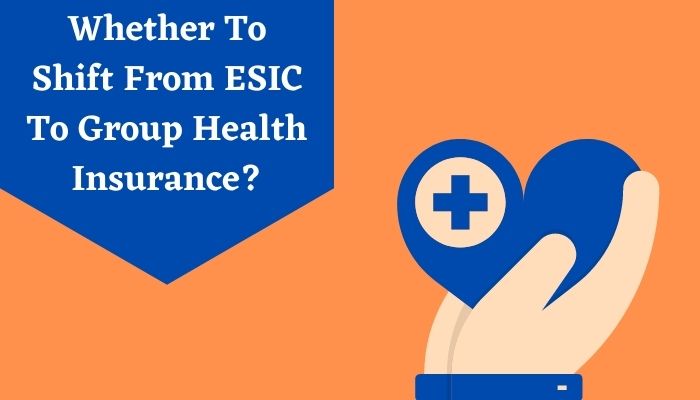Whether To Shift From ESIC To Group Health Insurance?
Working professionals often face many challenges in their daily life. But what can confuse them is the need for financial assistance in case of any untoward situations. If you are thinking about who will help you to deal with these sticky situations, then your answer will be ESI. ESIC stands for Employees State Insurance Corporation that offers socio-economic security and protection to employees and their dependent family members. To ensure the safety and protection of the workers, the parliament implemented the Employees’ State Insurance Act, 1948 (ESI Act).

ESIC insurance offers members with financial protection in case of an untimely health-related incident. ESI health insurance provides medical benefits, disability benefits, maternity benefits, unemployment allowance, and so on.
What is ESI Eligibility Criteria?
Let’s take a look at ESIC applicability criteria.
- A person who works in a non-seasonal factory that has more than 10 employees is eligible to get ESIC Insurance
- With effect from 1 January 2017, the wage limit of an employee is set at Rs. 21,000 per month and Rs. 25,000 (for disabled people) to get coverage under the ESIC scheme as per the ESI applicability limit
What is ESIC Coverage Limit?
This scheme offers coverage for sickness, maternity, death during employment, temporary or permanent disability, diseases contracted from the office, and any injury that can lead to income loss.
What is Group Health Insurance?
A group insurance policy is offered by an employer to his employees.

It has features like ambulance costs, health check-ups, maternity benefits, no room rent capping, personal accident cover, etc., an employer can customize the policy scheme for his employees.
What is the Difference between ESIC and Group Insurance?
Let’s compare ESIC and group health insurance.
1. Sum Insured: Under the ESIC scheme, there is no limit for sum insured. On the other hand, a group health policy offers a limited sum insured to the employees. But an employee can enhance the sum insured amount by paying additional premiums from his/her pocket.
2. Cashless Benefits: Though both ESIC and group health policy offer cashless facilities to policyholders still, only a few government hospitals offer this type of facility under the ESIC scheme. In case of an emergency, you will only find a few network hospitals that will offer you cashless facilities under the ESIC scheme. But for a group health insurance policy, the insurers are tied up with a wide range of network hospitals. You will get several hospitals that will allow you to enjoy cashless facilities in case of any medical emergency.
Why do you need to shift from ESIC to Group Health Insurance?
- Though ESIC offers coverage in case of a healthcare contingency, a group health insurance policy offers some additional benefits that are not covered by the ESIC scheme.
- For ESIC, an employee needs to pay a certain premium amount from his/her salary. But for a group health insurance plan, premiums are paid by the employer. If an employee needs to increase the sum insured amount, then he needs to pay an additional premium amount from his side.
- A group health insurance policy can be applied for those who are earning above Rs. 21,000 per month.
Before enrolling under a group insurance policy, discuss with your employer your healthcare requirements and needs.
What are the Top Benefits of a Group Health Insurance Policy?
Here are some following factors that will influence you to purchase a group health insurance policy.
- Employees don’t need to pay Premiums
A group health policy is offered by an employer to its employees; hence, all premiums are paid by the company. An employee can enjoy the benefits of a group health policy without paying anything
- Covers the employee and his/her family
Apart from offering coverage to an employee, a group health insurance policy also provides coverage to all dependent members of the employee, including spouse, children, and parents.
- No Waiting Period
Under a group health insurance policy, there is no waiting period for hospitalization. This means you are getting coverage from day 1.
- No Medical Check-up
You don’t need to undergo any medical check-up for enrolling under a group insurance policy.
- Coverage for Pre-existing Illnesses
All group health plans come with coverage for pre-existing ailments from day 1.
- Adequate Support for Sudden Medical Emergencies
In the case of a medical contingency, group health insurance plays an imperative role. If an employee or his/her family members require hospitalization under any healthcare emergency, then this plan will provide them with the best quality of treatment for their ailments/injuries.
- Performance and Morale-Boosting
Companies offer group health insurance to motivate employees so that they stay committed and loyal to the company. Employees can only focus on their work as the company looks after all their healthcare needs and requirements.
Who is not eligible for Group Health Insurance?
Group health insurance also has some restrictions. Let’s take a look at the eligibility criteria of a group health policy.
- Sole Proprietor: If a person operates a business without any employee, then he/she can’t be eligible for a group health insurance policy. The person can purchase an individual health insurance plan to strengthen the protection and coverage.
- Family Business: According to the insurance law, your spouse is not an employee. So, if you are running a family business, you are not eligible for a group health insurance plan.
The Conclusion
The employees who are already covered by the ESIC scheme can’t be covered under a group health policy. But an employee can request his ESIC employer if he/she wants to shift from an ESIC scheme to a group health insurance plan. An employee who is earning more than Rs. 21,000 per month can only be covered by a group health insurance plan.




























